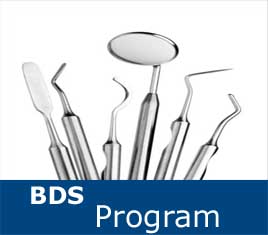|
|
|
|
BDS Program |

|
BDS (Bachelor of Dental Surgery) is a four program with curriculum conforming to
the regulations and recommendations of the Pakistan Medical and Dental Council
as follows:
|
First Professional |
Second Professional |
 |
Anatomy |
 |
Biochemistry |
 |
Physiology |
 |
Science of Dental Materials |
 |
Islamiat & Pakistan Studies |
|
 |
General Pathology |
 |
Pharmacology |
 |
Oral Biology |
 |
Community Dentistry |
|
 |
|
Third Professional |
Final Professional |
 |
Oral Pathology |
 |
Oral Medicine & Periodontology |
 |
General Medicine |
 |
General Surgery |
|
 |
Oral Surgery |
 |
Operative Dentistry |
 |
Prosthodontics |
 |
Orthodontics |
|
 |
|
|
|
|
|
Dentistry is a combination of ART & SCIENCE. General practitioners of dentistry
prevent, evaluate, diagnose, and treat diseases of the oral cavity and
associated structures, as well as maintain the functionality and aesthetics of
the teeth and associated tissues and structures. Evidence of dentistry (holes
from drilling) has been found in teeth dating from around 5500 BC to 7000 BC in
people of the Indus Valley Civilization. A Sumerian text from 5000 BC describes
a "tooth worm" as the cause of dental caries. Historically, dental extractions
have been used to treat a variety of illnesses. During the Middle Ages and
throughout the 19th century, dentistry was not a profession in itself, and often
dental procedures were performed by barbers or general physicians. Barbers
usually limited their practice to extracting teeth, which not only resulted in
the alleviation of pain, but often cured a variety of ailments linked to chronic
tooth infection. Instruments used for dental extractions date back several
centuries. |
|
|
|
In addition to general dentistry, there are ten recognized dental specialties. A
doctor is granted a certificate of specialty training after completion of a
residency or advance graduate training program. These include Dental Public
Health, Endodontics, Oral & Maxillofacial Pathology, Oral & Maxillofacial
Radiology, Oral and Maxillofacial Surgery, Orthodontics & Dentofacial
Orthopaedics, Anesthesiology, Periodontics, Pediatric Dentistry and
Prosthodontics The future looks bright for dentistry and the nation’s oral
health in the 21st century. Post-natal stem cell research, gene therapy transfer
and links between oral health and systemic health (other body systems) will
reshape dental practice in the 21st century. |
|
|
|
Nine reasons to become a Dentist: |
|
1. |
Be your own boss and own a dental practice. |
|
2. |
Create your own hours. |
|
3. |
Give patients smiles they are proud to wear. |
|
4. |
Feel good about improving patient's health and appearance. |
|
5. |
Use lasers, computer-generated imaging and other new technology. |
|
6. |
Be respected by family and friends. |
|
7. |
Use your artistic and scientific talents. |
|
8. |
Great income. |
|
9. |
Everyone needs dental care. |
|
|
|
|
ASSESSMENT AND PROMOTION |
|
Students’ knowledge and skills are continuously assessed in practicals,
tutorials, Journal Club presentations and Clincico-Pathological Conferences to
prepare them for Internal and Professional examinations. There are two scheduled
Internal Examinations each year: a Midterm and a Pre Professional Examination.
Each exam consists of a theory paper, as well as a practical and oral exam.
Professional Examinations are conducted by the University of Karachi. |
|
|
|
The University of Karachi conducts Professional Examinations for MBBS and BDS at
the end of each academic year. Each theory paper includes multiple choice
questions (One Best Choice type) and Short essay questions. Practical
examinations and viva voce for each subject are scheduled after the theory
papers. Students must score 50% in both theory and Viva/Practical to pass. |
|
|
|
According to PMDC Regulations, "Continuous internal assessment consists of
appropriate evaluation at the end of each assignment, term, stage or course of
the curriculum. Proper records of internal evaluations should be maintained, and
the scores obtained in these tests should contribute 30% to the final total
score of the candidates.” Marks scored by students on Internal Assessment are
included in the Practical/Viva Voce marks of the University Professional
Examinations. |
|
|
|
According to University of Karachi rules, no student with less then 75%
attendance may be allowed to sit for Professional Examinations. They must have
75% in lectures, tutorial, practicals and clinical assignments. There will be no
extra chances to make up this attendance, so students must attend the regularly
scheduled classes. If students are not present in class for any reason (illness,
trip abroad, family problems, etc.) they will be marked absent. Students must
also attend at least two internal tests, obtaining not less then 25% marks in
each test. Since each test consists of a theory paper and viva, students must
attend both theory and viva and must obtain a minimum of 25% in each part of the
test. Students not meeting these minimum requirements of the University of
Karachi will not be allowed to sit for Professional Examinations. |
|
|
|
Attendance of clinical assignments for Third, Fourth and Final Years will be
calculated at the time of sending exam forms for the Final Professional
Examination. There will be no opportunity at that time to make up short
attendance in clinics. Short attendance will not be condoned for any reason.
After Midterm Examinations, a letter detailing the student’s marks and
attendance to date is sent to the Parents/Guardians via courier service. Any
parent wishing to discuss the progress or attendance of their student may
contact the Student Affairs Office to make an appointment at 4935009. |
|
|
|
|